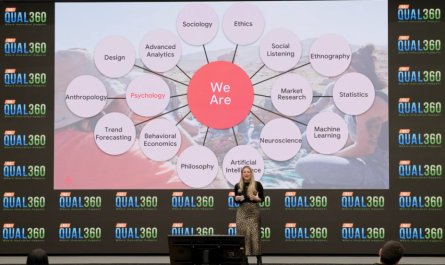If I left you with the impression in my last blog that Qual360 Europe was all about food, this may have been somewhat misleading. It was however, truly global in its range of case studies presented. In fact, many of the presentations showed different ways of dealing with cultural challenges in an international environment – and included some brilliant observations.
A study presented by Melissa Gonsalves from Unilever and Nathalie Gil from Bamm analysed the process of brushing teeth in a cultural context. It provided some strong examples how material culture gives us far deeper insights into the role a product may play in people’s lives. A (in many eyes) simple object like a toothbrush can have a dramatically different status in various parts of the world. So in order to understand the micro (oral care), it is paramount to understand the macro (hygiene, codes for cleanliness).
Additional insights showed that it can be dangerous to underestimate the aspirational thinking of your customers. A lower LSM (living standards measure) does not have to result in lower standards. Consumers in lower income, or remote areas for example are aspiring to use mid-range brands and would rather opt for those than for a lower range brand or smaller product sizes.
Dorel’s innovation team presented together with Joanna Brassett from Studio INTO. Dorel is active all over the world, developing relationships with customers to better understand their product choices and behaviour. Studio INTO’s newly developed approach to business innovation included the creation of an 80 strong panel of “Cultural Guides” across 62 countries.
A resent study in Asia opened the team’s eyes to how findings from one research project can help the entire organization better understand product use in different cultural contexts. Intended and actual use can differ significantly, how an example from China highlighted. Here, push chairs commonly presumed to be used in an outdoor environment, were often found to be used in house, with their use not limited to mobility but doubling up as high chair, play space or crib.
In a different part of the world, Safaricom was struggling to engage with the economically vital youth in Kenya. Having identified a disconnect with this important target group, the company engaged on a project using cultural codes to identify emotional drivers and better understand their target group.
After identifying key drives such as Friendship, Success and Freedom and benchmarking itself against other brands in the market, Safaricom launched a portal called Blaze to empower and connect with Kenya’s youth. The online community was a great success resulting in the turnaround from a declining to a growing NPS for the brand.
How do you produce a near overkill in online participation and complexities? Well, you would have to look at the European Commission for that, right (irony off) ? Luckily the EC had Krealinks and Kantar Public on its side to manage the “Horizon 2020 EUENGAGE” project. While online communities have been used by brands for some time now, they are relatively new to politics and public affairs. The EUENGAGE project aimed to engage citizens from 10 EU countries across 30 communities in order to better understand the relationship between the EU and its citizens.
Key success to the project according to Olivier Parnet from Kantar Public was the creation of a centralised moderation room in one location. Moderation of these deliberative communities proved to be a critical success factor in uncovering the richest insights and also ensuring consistency across the different (national) communities. The communities were seen by citizens as less “top down” communication and resulted in a better engagement with the potential to co-create, design and fine-tune new ideas.
Did you miss the Qual360 Europe conference? You can watch the video highlights below:









 by
by 

